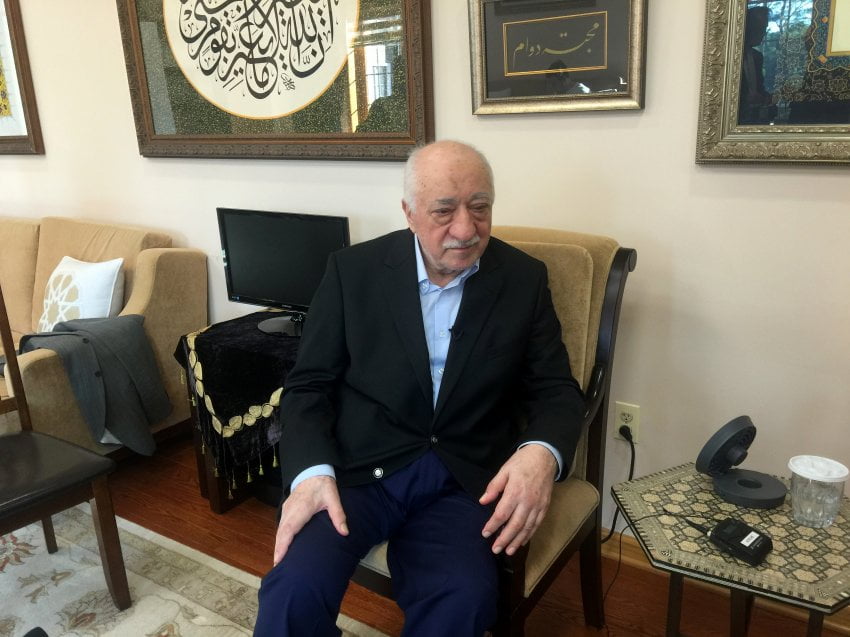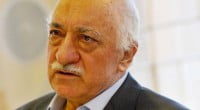Public Enemy No. 1: A Visit with Fethullah Gülen, Erdogan’s Chief Adversary

Date posted: July 19, 2016
In a meeting at his compound in Pennsylvania, Turkish cleric Fethullah Gülen defends himself against claims made by Turkey’s president that he was behind this weekend’s failed coup. He alleges that power has poisoned Erdogan.
Fethullah Gülen is sitting in a small reception room in his home. There’s a small side table next to him, a blue fan and a glass of water. He wears a dark blazer and leather slippers. The elderly man has something he wants to say.
“I am prepared to be screened by an international commission,” he says. “If they find that I am guilty, then I will go to the execution chamber. But that won’t happen because I haven’t done anything.”
Gülen has been the focus of a considerable amount of international attention in recent days, with Turkish President Recep Tayyip Erdogan having accused him and his influential Islamic movement of engineering the failed weekend military putsch in Turkey from his home in the United States. The preacher has been living in American exile since 1999 because of his many enemies in Turkey: His organization, called Hizmet, operates a global network of schools, firms and media companies — and is treated like a terrorist organization by Erdogan’s people. Gülen’s guarded complex, located near the small town of Saylorsburg, Pennsylvania, around 100 miles from New York, is considered by officials in Ankara to be the headquarters of its greatest enemy.
Erdogan’s accusations are serious, and Gülen wants to defend both himself and his movement. He says he had nothing to do with the putsch and that Erdogan’s behavior borders on insanity. “I have already said several times that I am against any form of violence when it comes to achieving political goals,” he says. Gülen also claims that he supports democracy in Turkey. “I reject military putsches,” he says.
A Rare Visit
Those visiting the 75-year-old are subjected to a security screening at the entrance to his spacious complex, with armed guards conducting checks of each guest. The subject of anonymous death threats, the FBI advised Gülen to take this precaution several years ago. There are several buildings on the park-like property where his followers dedicate themselves to prayer. Few people are in sight and a Porsche SUV can be seen in a parking spot. Normally, guests are only rarely received here — and the media have virtually no access.
But this weekend, Gülen opened his doors to a group of reporters. He lives reclusively, in the back part of the property and guests must either take off their shoes or wrap them with plastic foil before entering his rooms. Women must cover their shoulders.
The reception room is formal, with lots of gold, ornamentation, elegant carpets and fine porcelain. Koran suras hang from the walls and an encyclopedia of Islam can be found on the shelves. One shelf unit is covered with all kinds of knick-knacks: a plastic combat helicopter, a globe, a vase. There’s a portable radio in one corner and a view of the surrounding green hills from the window.
A Friendship Turned Sour
Gülen is sitting on a beige sofa and looks weak. One of his aides says he has been suffering from heart trouble and diabetes. Gülen speaks in Turkish with a quiet voice, but his answers are long — very long. The preacher comes across like a statesman himself as he talks about Erdogan. He knows the Turkish president well.
During the rise of Erdogan’s Justice and Development Party (AKP), Gülen and Erdogan were allies, united by their deep faith. Today they despise each other.
When Gülen went into exile, he called on his supporters to take over power in Turkey by infiltrating state institutions, thus prompting law enforcement officials to issue an arrest warrant for him.
Gülen’s rise began in the 1970s when he was an imam at a mosque in the northwestern Turkish city of Edirne. The charismatic cleric distributed his sermons via video and audio cassettes, and his following continuously grew. During the same period, he built up a network of private schools, private tutoring centers and dormitories, which he called “houses of light.” The alumnus of these institutions ultimately grew into a network of Gülen supporters over the decades. Today they own newspapers, television stations and banks.
Source: Spiegel , July 18, 2016
Tags: Defamation of Hizmet | Fethullah Gulen | Military coups in Turkey | North America | USA |
























